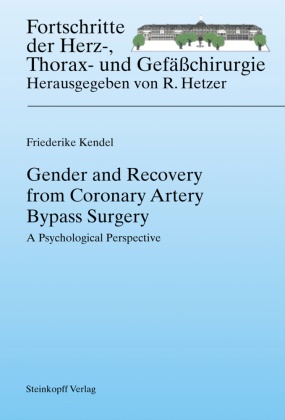Gender and Recovery from Coronary Artery Bypass Surgery - A Psychological Perspective
| Verlag | Steinkopff |
| Auflage | 2008 |
| Seiten | 104 |
| Format | 17,0 x 0,6 x 24,4 cm |
| Gewicht | 202 g |
| Artikeltyp | Englisches Buch |
| Reihe | Fortschritte in der Herz-, Thorax- und Gefäßchirurgie 7 |
| ISBN-10 | 3798518556 |
| EAN | 9783798518551 |
| Bestell-Nr | 79851855A |
Progress in coronary artery bypass graft surgery has irrefutably improved the quality of life of many patients. However, we are confronted with the finding that women - hibit a higher mortality rate than men. In part, this difference can be explained by clinical parameters such as age, disease severity, or comorbidity - factors that have been well studied, but which do not fully explain the observed differences. This is one reason why, in recent years, psychosocial variables have attracted special atten- on in this context. In fact, women and men having undergone a bypass operation - ry a great deal with respect to, e. g. , depression, partner status, and socio-economic status. Moreover, psychological well-being, on the one hand, and social isolation, on the other hand, definitely influence the recovery process, particularly when consi- red under the gender aspect. The Deutsches Herzzentrum Berlin has been actively supporting gender-specific research for many years. In this contex t, a large prospective study on gender dif- rences in recovery after bypass surgery, carried out by the Competence Network of Heart Failure, was started at our Department for Cardiothoracic and Vascular Sur- ry. From the beginning of the study, psychosocial variables were included as being substantial contributors. The starting point of the study presented here_ by psychologist Dr. Friederike Kendel are recent empirical investigations about gender differences in coronary heart disease and the course of recovery after bypass surgery.
Inhaltsverzeichnis:
Introduction: Gender Differences in Mortality After CABG.- Gender Aspects of Risk Factors.- Outcome Measures.- Hypotheses: Gender Differences in Risk Factors and Outcomes.- Moderator Hypotheses.- Mediator Hypotheses. Method: Participants.- Measurements.- General Statistical Procedures.- Sample.- Results: Predictors of Mortality and Physical Functioning Based on Preoperative Data.- Predictors of Well-Being Based on Longitudinal Data.- Predictive Relationship Between Physical Functioning and Depression.- Discussion: Gender Differences in Outcome.- Gender Aspects in Recovery.- Is Depression Predictive for Physical Functioning?- Limitations.- Clinical Implications.- Conclusion.- Summary.- References

